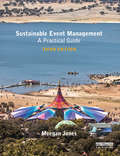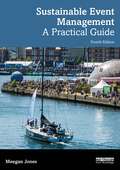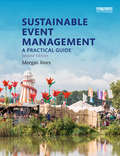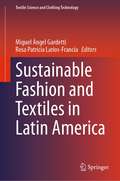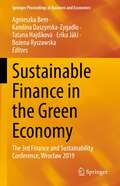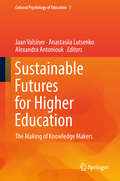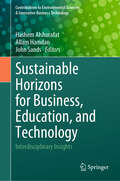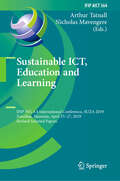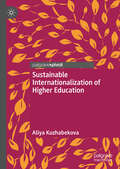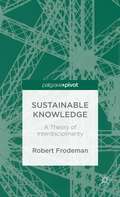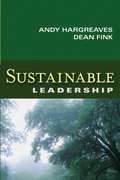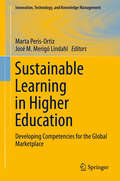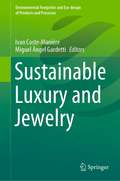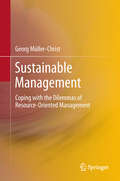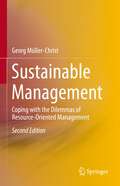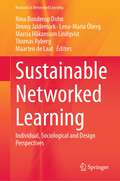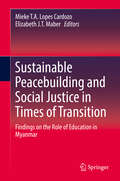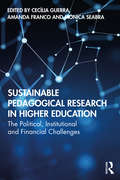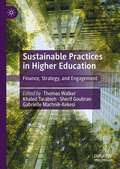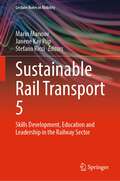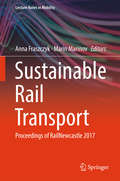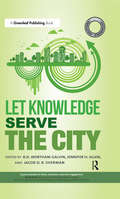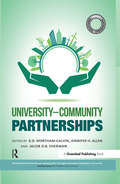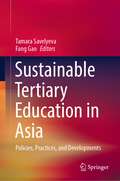- Table View
- List View
Sustainable Event Management: A Practical Guide
by Meegan JonesAcross the world each year events of every shape and size are held: from community events, school fairs and local business functions through to the world’s largest festivals, music events, conferences and sporting events. As well as causing celebration and giving voice to issues, these public parties use up resources, send out emissions and generate mountains of waste. Events also have the power to show sustainability in action and every sustainably produced event can inspire and motivate others to action. Written by a leader in event sustainability management, this book is a practical, step-by-step guide taking readers through the key aspects of how to identify, evaluate and manage event sustainability issues and impacts and to use the event for good – it's for events of any style and scale, anywhere in the world. Now in its third edition, this is the indispensable one-stop guide for event professionals and event management students who want to adjust their thinking and planning decisions towards sustainability, and who need a powerful, easy-to-use collection of tools to deliver events sustainably.
Sustainable Event Management: A Practical Guide
by Meegan JonesWritten by a leader in event sustainability management, this book is a practical, step-by-step guide taking readers through the key aspects of how to identify, evaluate, and manage event sustainability issues and impacts and to use the event for good – events of any style and scale, anywhere in the world.Each year events of every shape and size are held globally: from community events, school fairs, and local business functions through to the largest festivals, music concerts, conferences, and sporting events. As well as encouraging celebration and giving voice to issues, these public parties can use up resources, send out emissions, and generate mountains of waste. But events also have the power to showcase sustainability in action, and every sustainably produced event can inspire and motivate others to action. Thoroughly updated in its fourth edition, this book reflects what event sustainability best practice looks like in this new era of the discipline: circular and net zero, reusables and renewable energy, climate conscious catering – stakeholders expect it and the solutions now exist. The new edition also features additional case studies, and an updated look at greenhouse gas emissions measurement, providing readers with practical guidance on how to manage events responsibly.This is the indispensable one-stop guide for event professionals and event management students who want to keep up with industry best practices and who need a powerful, easy-to-use collection of tools to deliver events sustainably.
Sustainable Event Management: A Practical Guide
by Meegan Lesley JonesGatherings of people for a purpose always have and always will be a part of the human story. Those staging these events have a social and environmental responsibility to manage their impacts and enhance their positive lasting legacies. Written by a leader in the field, this book is a practical, step-by-step guide taking readers through the key aspects of how to identify, evaluate and manage event sustainability issues and impacts - for events of any style and scale, anywhere in the world. The product of tried-and-tested methods, coverage includes numerous examples and case studies from across the world, such as Boom (Portugal), Bonnaroo (USA), Hurricane (Germany), and Glastonbury (UK) Festivals. Readers are provided with checklists for action and tools for measuring performance. This updated second edition includes a detailed review of the new international standard ISO 20121 Event Sustainability Management Systems along with other recent standards and certifications. It expands detail on measuring and reporting event sustainability performance outcomes with explanation of the Global Reporting Initiative Event Organizers Sector Supplement performance indicators. This is the indispensable one-stop guide for event professionals and event management students who want to adjust their thinking and planning decisions towards sustainability, and who need a powerful, easy to use collection of tools to deliver events sustainably.
Sustainable Fashion and Textiles in Latin America (Textile Science and Clothing Technology)
by Miguel Ángel Gardetti Rosa Patricia Larios-FranciaThis book highlights the sustainable aspects of fashion and textiles in Latin America and discusses how the manufacturing and consumption of textile products and fashion are significant sources of environmental damage. It addresses important issues of water and energy consumption in the textile and fashion industry and using case studies presents how social responsibilities in consumer behavior can help in minimizing these environmental issues for a better future.
Sustainable Finance in the Green Economy: The 3rd Finance and Sustainability Conference, Wrocław 2019 (Springer Proceedings in Business and Economics)
by Agnieszka Bem Bożena Ryszawska Erika Jáki Karolina Daszynska-Zygadlo Tatana HajdíkováThis book explores issues related to green and sustainable finance which aims at the transformation of economies into a new, more sustainable model. It covers a variety of issues related to various financial areas, such as: corporate finance, public finance, monetary and fiscal policy, and risk management. The enclosed papers reflect the extent, diversity, and richness of research areas in the finance and sustainability fields, both fundamental and applied, and are beneficial to researchers, practitioners, scholars and policy makers in economics, finance, and international economics.
Sustainable Futures for Higher Education: The Making of Knowledge Makers (Cultural Psychology of Education #7)
by Jaan Valsiner Anastasiia Lutsenko Alexandra AntonioukThis volume addresses the current situation in higher education and what creative action needs to be taken for the future development of the various systems of higher education. Higher education in the 21st centuries is under immense pressure from various sides. First, there is dramatic limitation of funding from public sources and limited and selective funding support from private sources that is re-constructing the landscape of higher education in most societies around the World. Secondly there is the continuous stream of administrative re-organization efforts of political origins (e.g. “the Bologna process”) that guide the advancement of higher education in our present time. Increasing privatization of all forms of higher education—from bachelor to doctoral levels—and its corresponding focus on the advancement of the kind of knowledge that has immediate applicability in various spheres of societies leads to the question- what kind of creativity is expected from the new cohorts of students—future makers of knowledge—once the current social re-organization of higher education systems becomes fully established. To address these questions the international, interdisciplinary cast of authors in this volume provides a multitude of possible scenarios for future development of the systems of higher education. This book on “Sustainable Futures of Higher Education” captures the current trends and perspectives of the Knowledge Makers from various nations of the world on meeting and greeting the challenges of globalization and the pressures of the knowledge economy. It makes a strong case for universities of tomorrow sustaining their autonomous thinking and yet nurturing an environment of collaborative partnership with society, corporate and industry to fuel innovations in plenty and continuous supply of new science and technologies. Higher Education has been and shall remain a powerful vehicle of national and global transformation. I see a great value of the publication in impacting the minds of the leaders in higher education around the globe for revitalizing the universities.Professor P. B Sharma, President of Association of Indian Universities, AIU How should the higher education system be in the globalization era? In this book Jaan Valsiner and his colleagues analyze, criticize the existing and propose a new higher education system. When we say "higher education”, three different layers are supposed to be there-- the lower, the middle and the higher. The latter has the function of production of new knowledges. Without new knowledge, our societies are never improving. Authors warn commercialized systems such as the “Bologna system” overestimate the homogeneity of education. ““Universities without Borders” would guarantee both diversity and innovation in the higher education systems.Professor Tatsuya Sato, Dean of Research, Ritsumekan University
Sustainable Horizons for Business, Education, and Technology: Interdisciplinary Insights (Contributions to Environmental Sciences & Innovative Business Technology)
by Allam Hamdan Hashem Alshurafat John SandsThis book offers a detailed analysis of the intersection of sustainability, innovation, and global progress, and it comprehensively explores sustainable practices and their impact on business, education, and technology. The book shows how businesses can incorporate sustainability into their core operations, including environment-friendly supply chains, renewable energy adoption, circular economy models, ethical decision-making, and sustainable growth strategies. Successful sustainable businesses and the benefits of their socially responsible practices are highlighted. In addition, the book explores how education can shape a sustainable future. It is necessary to integrate the ideas of sustainability into the curricula of early childhood education to higher learning institutions to educate and empower the next generation of changemakers. The role of technology in advancing sustainability efforts is also investigated, including artificial intelligence, blockchain, clean energy solutions, green architecture, and smart cities. Other topics explored in the book include global sustainability efforts such as international collaborations, public-private partnerships, and multilateral initiatives; the role of governments, NGOs, and international organizations in promoting sustainable development; ethical considerations and social impacts of sustainable practices, for example, social justice, inclusivity, and environmental stewardship; connections between sustainable development and improved quality of life; and groundbreaking ideas and innovations for industries to tackle sustainability issues. The book offers a comprehensive and forward-looking perspective on sustainability. By combining different viewpoints, the book empowers readers with the knowledge and inspiration to contribute meaningfully to a more sustainable, inclusive, and resilient world.
Sustainable ICT, Education and Learning: IFIP WG 3.4 International Conference, SUZA 2019, Zanzibar, Tanzania, April 25–27, 2019, Revised Selected Papers (IFIP Advances in Information and Communication Technology #564)
by Arthur Tatnall Nicholas MavengereThis book constitutes the refereed post-conference proceedings of the First IFIP WG 3.4 International Conference on Sustainable ICT, Education, and Learning, SUZA 2019, held in Zanzibar, Tanzania, in April 2019, in conjunction with the 15th IFIP WG 9.4 International Conference on Social Implications of Computers in Developing Countries.The 27 revised full papers presented in this volume were carefully reviewed and selected from 41 submissions. The papers cover topics such as peer and collaborative learning in informatics; pedagogical approaches to teaching specific informatics courses; workplace learning related to information systems; e-learning; ICTs for development; mobile solutions in learning in the North and South; lifelong learning; applications for disabled students; traversal skills and computational thinking; and teacher education in the global South.
Sustainable Internationalization of Higher Education
by Aliya KuzhabekovaThis book analyzes the concept of sustainability as it applies to internationalization of higher education. The topic of sustainability is relatively well explored in the context of higher education. It is becoming increasingly discussed by scholarly societies in international and comparative education. However, there is still a dearth of studies on the topic within the narrow field of international and comparative education. This book presents an organizing framework to explore sustainable internationalization in a comprehensive way and offers practical insights on how sustainable internationalization can be achieved in various aspects of internationalization.
Sustainable Knowledge: A Theory of Interdisciplinarity
by Robert FrodemanSustainable Knowledge rethinks the nature of interdisciplinary research and the place of philosophy and the humanities in society and offers a new account of what is at stake in talk about 'interdisciplinarity'.
Sustainable Leadership
by Andy Hargreaves Dean FinkIn Sustainable Leadership, Andy Hargreaves and Dean Fink address one of the most important and often neglected aspects of leadership: sustainability. The authors set out a compelling and original framework of seven principles for sustainable leadership characterized by Depth of learning and real achievement rather than superficially tested performance; Length of impact over the long haul, beyond individual leaders, through effectively managed succession; Breadth of influence, where leadership becomes a distributed responsibility; Justice in ensuring that leadership actions do no harm to and actively benefit students in other schools; Diversity that replaces standardization and alignment with diversity and cohesion; Resourcefulness that conserves and renews leaders' energy and doesn't burn them out; and Conservation that builds on the best of the past to create an even better future.This book is a volume in the Jossey-Bass Leadership Library in Education--a series designed to meet the demand for new ideas and insights about leadership in schools.
Sustainable Learning
by Lorraine Graham Jeanette Berman Anne Bellert Lorraine Graham Jeanette BermanSustainable Learning: Inclusive Practices for 21st Century Classrooms provides readers with the knowledge and skills to be confident and effective inclusive teachers. The authors show that these skills are essential to quality teaching – teaching that is evidence-based, purposeful, relevant and responsive to students' needs. The book employs three overarching frameworks to examine inclusive practices in education: equity (learning for all), values (learning that matters) and sustainability (learning that lasts). It encourages teachers to see all students as developing learners and to consider the complexities and diversity of learning in the 21st century. In doing so, it canvasses topics such as a sustainable approach to inclusion, learning processes, teaching processes, differentiation, assessment to support teaching and learning, and life-long learning. Chapter features include: • 'Think and do' exercises • Examples, case studies and vignettes • Tables, figures and diagrams to help readers visualise core ideas, theories and themes
Sustainable Learning in Higher Education
by Marta Peris-Ortiz José M. Merigó LindahlIn an era of globalization, technological innovation, and social transformations, universities face the challenge of training students with the competencies needed to meet the demands of the market and to successfully integrate into today's workforce. This book looks at the university as a dynamic source of essential competencies and explores various skill management models, methodologies and innovations applied by educational institutions around the world. The demands of today's society represent a major challenge for universities and their teaching staffs. Professors need to adapt their teaching methods to meet these new challenges. For example, universities need to prepare new generations of students with the ability to select, update and use knowledge, rather than processing facts and formulas. Students need to be capable of learning in different contexts and modalities throughout their professional careers and learn to adapt their knowledge to new situations. In response, a conceptual and methodological change has taken place in the university organizational culture and in student curriculums. This book presents a variety of cases and observations on the competencies developed in the curriculums of universities around the world, with the aim to assure that graduates leave fully prepared to face the challenges of the new economy.
Sustainable Luxury and Jewelry (Environmental Footprints and Eco-design of Products and Processes)
by Ivan Coste-Manière Miguel Ángel GardettiThis book discusses the current trends in luxury and jewelry and presents how to make these sustainable for a better future. In the age of sustainability, we increasingly see how designers and consumers begin to think beyond a product's look&feel and operation, and are especially concerned about what has happened during its manufacturing process and what will happen once its useful life comes to an end. Today, consumers value that every industrial product and process should be sustainable, beneficial for the people, the economy and the planet, and so is the case for jewelry.
Sustainable Management
by Georg Müller-ChristIn this book, a resource-oriented perception of sustainable management is presented. Firms that decide to act more sustainable have to bear in mind that they do not only need resources for economic activities today, but that they will need these tomorrow as well. This leads to contradictory management rationalities firms must deal with. The author presents his findings as regards the development of environmental and social responsibility and introduces a theory of management ecology. He takes a close look at the contradictions businesses have to face when governing their activity towards sustainability. Moreover, he identifies different notions of the resource term in management studies and develops a "sustainable resource management" which could help businesses redirect their economic activities from a solely profit-oriented to a resource-oriented way of operating.
Sustainable Management: Coping with the Dilemmas of Resource-Oriented Management
by Georg Müller-ChristIn the second edition of this book, the concept of resource-based sustainability has once again been expanded to include further references to modern management theories. The author shows that overcoming the dilemmas that sustainability creates for companies and all organizations leads to more complex decisions that also require higher levels of awareness. The concept of sustainable leadership is closely related to the resource approach. Finally, readers will learn how to tell a compelling transformation narrative toward sustainability.
Sustainable Networked Learning: Individual, Sociological and Design Perspectives (Research in Networked Learning)
by Thomas Ryberg Maarten De Laat Nina Bonderup Dohn Jimmy Jaldemark Lena-Maria Öberg Marcia Håkansson LindqvistThis book provides cutting-edge research on networked learning, focusing on issues of sustainability in design for learning, data use, and networked learning connections. It contributes novel theoretical perspectives on networked learning, its role in society and potential for sustainable learning design. It further contributes a set of exemplary empirical cases - exemplary in terms of their innovative learning designs, pedagogical use of technology in connecting learners, and/or critical reflections on implications of utilizing different technologies to support learning. The book is organized into four main sections: 1) Data and datafication, 2) Sustainable learning design, 3) Sociological perspectives on Networked Learning, and 4) Networked learning in times of lockdown. Concluding the book is a final chapter which points to emerging issues within the field of networked learning, based on discussion of perspectives from the chapters The book's focus on the nature of learning and technology-mediated interactions makes it of prime significance to researchers and practitioners in the field of technology-supported teaching and learning.
Sustainable Peacebuilding and Social Justice in Times of Transition: Findings on the Role of Education in Myanmar
by Mieke T.A. Lopes Cardozo Elizabeth J.T. MaberThis book offers a unique insight into the ways in which education systems, governance, and actors at multiple scales interact in initial steps towards building peace. It presents a spectrum of recently conducted research in the context of Myanmar, a society in the midst of challenging transitions, politically, socio-culturally and economically. Divided in 3 thematical research areas, the first part on Myanmar’s policy landscape aims to unravel the integration of peacebuilding into the education sector at macro and micro policy levels. The second part examines the role teachers play in processes of peacebuilding, and the third part examines ways in which formal and non-formal peacebuilding education programs address the agency of youth in Myanmar. This book is an essential guide for students embarking in the field of education, conflict and peacebuilding.
Sustainable Pedagogical Research in Higher Education: The Political, Institutional and Financial Challenges
by Cecília Guerra Amanda Franco Mónica SeabraConsidering both the theoretical and practical possibilities of the sustainability of higher education research in a world in which research budgets are often hard to secure, this book shares results from international research to demonstrate the innovation occurring to secure sustainable research funding. Rooted in diverse research experiences and reflections of academics and higher education institutional leaders, this book explores ways to promote and sustain pedagogical innovation in the higher education context. Beginning with an analysis of theoretical views from political, institutional and research practice spheres about the relevance of sustainability of educational research in higher education, it considers the need to promote educational research focused on pedagogical innovations in higher education. The second part of the book addresses practical experiences of funded educational research and offers guidance to assure the future of sustainable pedagogical interventions. This book is ideal reading for anyone interested in the role of sustainable funding in ensuring the future of higher education research, including researchers and postgraduate or undergraduate students who are researching or interested in the topic. It will also be of interest to senior institutional leaders and managers responsible for educational development in higher education.
Sustainable Practices in Higher Education: Finance, Strategy, and Engagement
by Thomas Walker Sherif Goubran Gabrielle Machnik-Kekesi Khaled TarabiehThis edited collection presents, reviews, and critically analyzes sustainable practices and long-term-oriented decision-making in Higher Education Institutions (HEIs). Campus closures and the quick transition to hybrid or e-learning as a result of the COVID-19 pandemic caused HEI stakeholders, including students, faculty, and staff, to swiftly adopt new ways of learning, teaching, and administering that were unfathomable only months before. This radical and challenging shift left many in academia with a sense that there is tremendous potential for HEIs to take the lead – both from an educational and practical standpoint – in fostering on- and off-campus sustainability and combatting climate change. In this book, the editors and their contributors systematically highlight current challenges that are slowing or derailing HEIs’ finance-related initiatives and practices geared toward sustainability. The case studies collected in this book provide a holistic overview of the ways in which financial and other long-term decisions can lead to more sustainable practices in higher education.
Sustainable Rail Transport 5: Skills Development, Education and Leadership in the Railway Sector (Lecture Notes in Mobility)
by Marin Marinov Stefano Ricci Janene Kay PiipThis book offers a timely collection of chapters on innovative research and education-focused developments in the vast field of rail transport, including rail operations, management, economics, and sustainable infrastructure. Adding on the tradition of the previous four volumes, here a special emphasis is given on the current needs for rail skills development, innovating rail higher education provision, and solutions aimed at bridging the gap between railway education and industry expectations. Strategies for making the rail sector more attractive to early careers and younger generations, and methods to identify and retain talents in the railway sector are also described. Gathering peer-reviewed contributions prepared by the RailUniNet and AstonRail strategic partnership members, this book offers a timely view on current developments on rail-focused teaching and learning methods and approaches with extensive information for both academics and professionals specialising in railway research, technologies, training and education.
Sustainable Rail Transport: Proceedings of RailNewcastle 2017 (Lecture Notes in Mobility)
by Marin Marinov Anna FraszczykThese conference proceedings include a collection of articles presented at the RailExchange conference in October 2017 at Newcastle University, UK. They will be useful for researchers in developing countries looking for opportunities of knowledge exchange. The RailExchange project aimed to develop sustainable railway education in Thailand, via international partnerships and industry collaborations based around stakeholders' expertise and experiences. It involved staff exchange (academics and researchers) between Mahidol and Newcastle University for joint research and curriculum development and also organizing railway conferences and workshops in both Thailand and the UK.The papers published here focus on rail-related issues and present a perspective of a widely understood 'exchange' in academia and industry environments. 'Exchange' is perceived as rail knowledge exchange between partners, rail staff exchange between academia and/or industry, research exchange between teams, student-lecturer knowledge exchange, academia-industry collaboration, etc. In addition, more general rail-related papers are also included.
Sustainable Solutions: Let Knowledge Serve the City
by B.D. Wortham-Galvin Jennifer H. Allen Jacob D.B. ShermanPortland, Oregon. Sustainability might not seem glamourous, but Portland is making a name for itself as one of the most sustainable cities in the world. Whether you’ve heard about the farmers’ markets, the cycle-friendly streets or the ongoing efforts to balance livability and equity, Portland is leading the way in urban sustainability: this book helps us understand how it achieves this.A critical component of Portland’s success is collaboration between different communities and institutions; the Sustainable Solutions series examines higher education’s role in these partnerships. In exploring how best to “let knowledge serve the city”, Portland State University translates its founding motto from mere words to applied research and action.This first volume examines different approaches to collaborative work that PSU has taken, both within the university and with community partners: how have barriers been overcome between different areas of study, between academia and the public, and why is bridging these divides so important? It also introduces the themes of the engaged university, social justice, climate change and sustainable economic development, which shape PSU’s work.Let Knowledge Serve the City is ideal for anyone seeking best practice in connecting students and universities with the needs of local communities. From public interest design and student leadership, to food justice and age-friendly development, authors combine academically rigorous theories of sustainability and community-university partnerships with lessons learned on how to realize ideals of sustainable development.
Sustainable Solutions: University–Community Partnerships (Sustainable Solutions Ser. #2)
by B.D. Wortham-Galvin Jennifer H. Allen Jacob D.B. ShermanWhat is the role of the university? Current systems may stress research output, but Wortham-Galvin, Allen, and Sherman seek to re-establish the importance of teaching and service in the work of the 21st-century university. The Sustainable Solutions series shares Portland State University’s experience of community-engaged teaching and research. With a focus on sustainability, we see that such collaboration is vital to making Portland one of the world’s most sustainable cities.Volume 2, University–Community Partnerships, builds on the themes introduced in Volume 1, Let Knowledge Serve the City, to explore how these partnerships play out in practice. Covering 13 projects, which range from supporting local artisans and researching food access, to sharing Indigenous history and decolonizing perceptions of knowledge, readers receive pragmatic advice on working with community organizations. Authors also offer critical reflection on how theories of engagement have structured PSU’s work and how their findings impact our very understanding of partnership.This reader-friendly text provides an ideal introduction to anyone wishing to learn more about models of effective collaboration and how to put these into practice. Explained through the context of specific projects, the book offers both inspiration and practical guidance to anyone — in local government, academia, or the third sector — looking to set up productive community–university partnerships.
Sustainable Tertiary Education in Asia: Policies, Practices, and Developments
by Tamara Savelyeva Gao FangThis edited volume offers a comprehensive reference point to an interdisciplinary and trans-boundary analysis of the sustainability of Asian tertiary education systems. The four sections of the volume –Collaborations, Transformations, Global-Local Tensions, and Future Developments—reflect the current conditions, ongoing changes, and new directions of the universities’ transformative contribution to the 2030 UN Agenda and its Sustainable Development Goals (SDGs). The chapters in this volume draw on inquiries and experiences from 12 research projects conducted in Asia, featuring cases from South Korea, Kazakhstan, Russia, and China, and include regions such as the Hong Kong Special Administrative Region of China, Ural-Siberian, and the Far Eastern regions of Russia. The collection of the studies presented in this volume offers a general framework for sustainable tertiary education that, with some adaptations, could be applied to other tertiary education systems in the world. The present volume, Sustainable Tertiary Education in Asia: Policies, Practices, and Developments, contributes to the research arena of Higher Education Sustainability by fostering a cross-cultural dialog among sustainability stakeholders of tertiary education in Asia and beyond.
